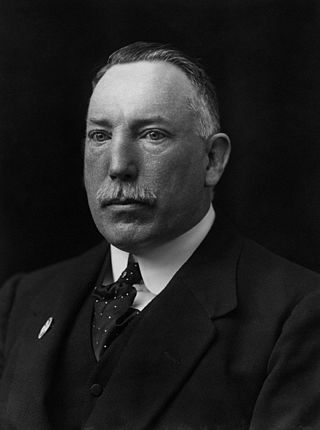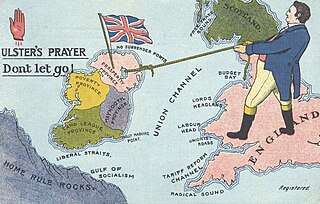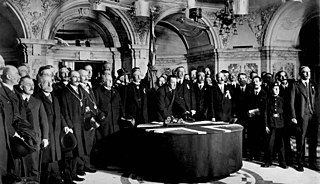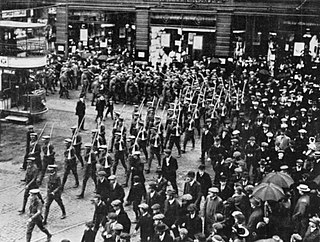
James Craig, 1st Viscount CraigavonPC PC (NI) DL, was a leading Irish unionist and a key architect of Northern Ireland as a devolved region within the United Kingdom. During the Home Rule Crisis of 1912–14, he defied the British government in preparing an armed resistance in Ulster to an all-Ireland parliament. He accepted partition as a final settlement, securing the opt out of six Ulster counties from the dominion statehood accorded Ireland under the terms of the 1921 Anglo-Irish Treaty. From then until his death in 1940, he led the Ulster Unionist Party and served Northern Ireland as its first Prime Minister. He publicly characterised his administration as a "Protestant" counterpart to the "Catholic state" nationalists had established in the south. Craig was created a baronet in 1918 and raised to the Peerage in 1927.

Unionism in Ireland is a political tradition that professes loyalty to the crown of the United Kingdom and to the union it represents with England, Scotland and Wales. The overwhelming sentiment of Ireland's Protestant minority, unionism mobilised in the decades following Catholic Emancipation in 1829 to oppose restoration of a separate Irish parliament. Since Partition in 1921, as Ulster unionism its goal has been to retain Northern Ireland as a devolved region within the United Kingdom and to resist the prospect of an all-Ireland republic. Within the framework of the 1998 Belfast Agreement, which concluded three decades of political violence, unionists have shared office with Irish nationalists in a reformed Northern Ireland Assembly. As of February 2024, they no longer do so as the larger faction: they serve in an executive with an Irish republican First Minister.

Irish nationalism is a nationalist political movement which, in its broadest sense, asserts that the people of Ireland should govern Ireland as a sovereign state. Since the mid-19th century, Irish nationalism has largely taken the form of cultural nationalism based on the principles of national self-determination and popular sovereignty. Irish nationalists during the 18th, 19th, and 20th centuries such as the United Irishmen in the 1790s, Young Irelanders in the 1840s, the Fenian Brotherhood during the 1880s, Fianna Fáil in the 1920s, and Sinn Féin styled themselves in various ways after French left-wing radicalism and republicanism. Irish nationalism celebrates the culture of Ireland, especially the Irish language, literature, music, and sports. It grew more potent during the period in which all of Ireland was part of the United Kingdom, which led to most of the island gaining independence from the UK in 1922.
"Rome Rule" was a term used by Irish unionists to describe their belief that with the passage of a Home Rule Bill, the Roman Catholic Church would gain political power over their interests in Ireland. The slogan was popularised by the Radical MP and Quaker John Bright during the first Home Rule crisis in the late 19th century and continued to be used in the early 20th century.

The Irish Confederate Wars, also called the Eleven Years' War, took place in Ireland between 1641 and 1653. It was the Irish theatre of the Wars of the Three Kingdoms, a series of civil wars in the kingdoms of Ireland, England and Scotland – all ruled by Charles I. The conflict had political, religious and ethnic aspects and was fought over governance, land ownership, religious freedom and religious discrimination. The main issues were whether Irish Catholics or British Protestants held most political power and owned most of the land, and whether Ireland would be a self-governing kingdom under Charles I or subordinate to the parliament in England. It was the most destructive conflict in Irish history and caused 200,000–600,000 deaths from fighting as well as war-related famine and disease.

Ulster's Solemn League and Covenant, commonly known as the Ulster Covenant, was signed by nearly 500,000 people on and before 28 September 1912, in protest against the Third Home Rule Bill introduced by the British Government in the same year.

The Irish Unionist Alliance (IUA), also known as the Irish Unionist Party, Irish Unionists or simply the Unionists, was a unionist political party founded in Ireland in 1891 from a merger of the Irish Conservative Party and the Irish Loyal and Patriotic Union (ILPU) to oppose plans for home rule for Ireland within the United Kingdom of Great Britain and Ireland. The party was led for much of its existence by Colonel Edward James Saunderson and later by St John Brodrick, 1st Earl of Midleton. In total, eighty-six members of the House of Lords affiliated themselves with the Irish Unionist Alliance, although its broader membership among Irish voters outside Ulster was relatively small.

The Young Citizen Volunteers of Ireland, or Young Citizen Volunteers (YCV) for short, was an Irish civic organisation founded in Belfast in 1912. It was established to bridge the gap for 18 to 25 year olds between membership of youth organisations—such as the Boys' Brigade and Boy Scouts—and the period of responsible adulthood. Another impetus for its creation was the failure of the British government to extend the legislation for the Territorial Force—introduced in 1908—to Ireland. It was hoped that the War Office would absorb the YCV into the Territorial Force, however such offers were dismissed. Not until the outbreak of World War I did the YCV—by then a battalion of the UVF—become part of the British Army as the 14th Battalion of the Royal Irish Rifles.

Ulster loyalism is a strand of Ulster unionism associated with working class Ulster Protestants in Northern Ireland. Like other unionists, loyalists support the continued existence of Northern Ireland within the United Kingdom, and oppose a united Ireland independent of the UK. Unlike other strands of unionism, loyalism has been described as an ethnic nationalism of Ulster Protestants and "a variation of British nationalism". Loyalists are often said to have a conditional loyalty to the British state so long as it defends their interests. They see themselves as loyal primarily to the Protestant British monarchy rather than to British governments and institutions, while Garret FitzGerald argued they are loyal to 'Ulster' over 'the Union'. A small minority of loyalists have called for an independent Ulster Protestant state, believing they cannot rely on British governments to support them. The term 'loyalism' is usually associated with paramilitarism.

The partition of Ireland was the process by which the Government of the United Kingdom of Great Britain and Ireland (UK) divided Ireland into two self-governing polities: Northern Ireland and Southern Ireland. It was enacted on 3 May 1921 under the Government of Ireland Act 1920. The Act intended both territories to remain within the United Kingdom and contained provisions for their eventual reunification. The smaller Northern Ireland was duly created with a devolved government and remained part of the UK. The larger Southern Ireland was not recognised by most of its citizens, who instead recognised the self-declared 32-county Irish Republic. On 6 December 1922 Ireland was partitioned. At that time the territory of Southern Ireland left the UK and became the Irish Free State, now known as the Republic of Ireland.

The All-for-Ireland League (AFIL) was an Irish, Munster-based political party (1909–1918). Founded by William O'Brien MP, it generated a new national movement to achieve agreement between the different parties concerned on the historically difficult aim of Home Rule for the whole of Ireland. The AFIL established itself as a separate non-sectarian party in the House of Commons of the United Kingdom of Great Britain and Ireland, binding a group of independent nationalists MPs to pursue a broader concept of Irish nationalism, a consensus of political brotherhood and reconciliation among all Irishmen, primarily to win Unionist consent to an All-Ireland parliamentary settlement.

The Ulster Volunteers was an Irish unionist, loyalist paramilitary organisation founded in 1912 to block domestic self-government for Ireland, which was then part of the United Kingdom. The Ulster Volunteers were based in the northern province of Ulster. Many Ulster Protestants and Irish unionists feared being governed by a nationalist Catholic-majority parliament in Dublin and losing their links with Great Britain. In 1913, the militias were organised into the Ulster Volunteer Force (UVF) and vowed to resist any attempts by the British Government to impose Home Rule on Ulster. Later that year, Irish nationalists formed a rival militia, the Irish Volunteers, to safeguard Home Rule. In April 1914, the UVF smuggled 25,000 rifles into Ulster from Imperial Germany. The Home Rule Crisis was interrupted by the First World War. Much of the UVF enlisted with the British Army's 36th (Ulster) Division and went to fight on the Western Front.

The Loyal Orange Institution, commonly known as the Orange Order, is an international Protestant fraternal order based in Northern Ireland and primarily associated with Ulster Protestants. It also has lodges in England, Scotland and the Republic of Ireland, as well as in parts of the Commonwealth of Nations and the United States. The Orange Order was founded by Ulster Protestants in County Armagh in 1795, during a period of Protestant–Catholic sectarian conflict, as a fraternity sworn to maintain the Protestant Ascendancy in Ireland. The all-island Grand Orange Lodge of Ireland was established in 1798. Its name is a tribute to the Dutch-born Protestant king William of Orange, who defeated Catholic king James II in the Williamite–Jacobite War (1689–1691). The Order is best known for its yearly marches, the biggest of which are held on or around 12 July, a public holiday in Northern Ireland.

The Scottish Protestant League (SPL) was a far-right political party in Scotland during the 1920s and 1930s. The League was led by Alexander Ratcliffe, who founded it in 1920.

The Home Rule movement was a movement that campaigned for self-government for Ireland within the United Kingdom of Great Britain and Ireland. It was the dominant political movement of Irish nationalism from 1870 to the end of World War I.

James Brown Armour (1841–1928), usually known as J. B. Armour, was an Irish Presbyterian minister who sought to rally Protestant opinion in the north of Ireland in support of tenant right and against landlordism, and, in his later years, in favour of Irish Home Rule and against threatened unionist resistance to an Irish national parliament.

Colonel Frederick Hugh Crawford, CBE, JP was an officer in the British Army. A staunch Ulster loyalist, Crawford is most notable for organising the Larne gun-running which secured guns and ammunition for the Ulster Volunteers (UVF) in 1914, which made him a hero for Northern Ireland's unionists.
Irish Protestant Home Rule Association was founded in Belfast in the Castle Restaurant in Donegall Place on 21 May 1886 to support Gladstones Home Rule bill for Ireland among members of the various Protestant faiths, following a defeat in the House of Commons.

The Home Rule Crisis was a political and military crisis in the United Kingdom of Great Britain and Ireland that followed the introduction of the Third Home Rule Bill in the House of Commons of the United Kingdom in 1912.
Ulster Protestants are an ethnoreligious group in the Irish province of Ulster, where they make up about 43.5% of the population. Most Ulster Protestants are descendants of settlers who arrived from Britain in the early 17th century Ulster Plantation. This was the settlement of the Gaelic, Catholic province of Ulster by Scots and English speaking Protestants, mostly from the Scottish Lowlands and Northern England. Many more Scottish Protestant migrants arrived in Ulster in the late 17th century. Those who came from Scotland were mostly Presbyterians, while those from England were mostly Anglicans. There is also a small Methodist community and the Methodist Church in Ireland dates to John Wesley's visit to Ulster in 1752. Although most Ulster Protestants descend from Lowland Scottish people, many descend from English, and to a lesser extent, from Irish, Welsh and Huguenots.
















